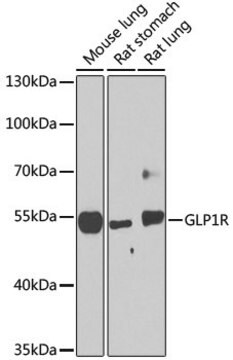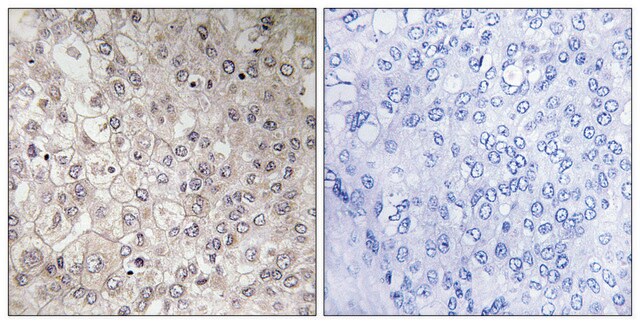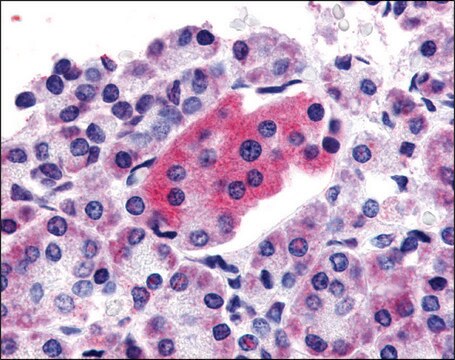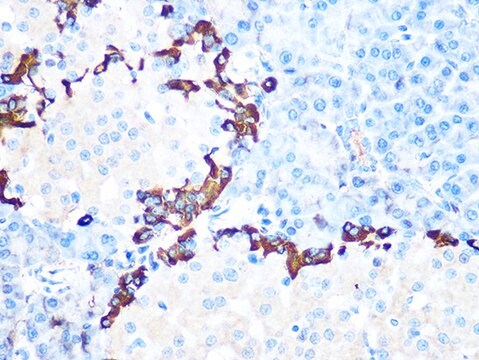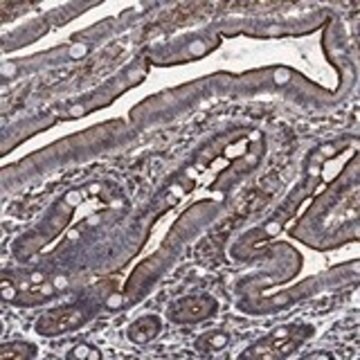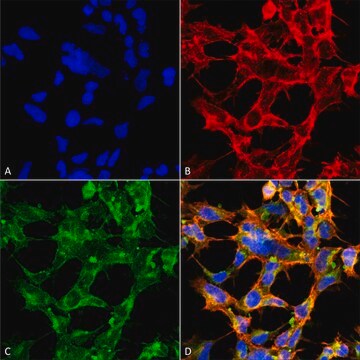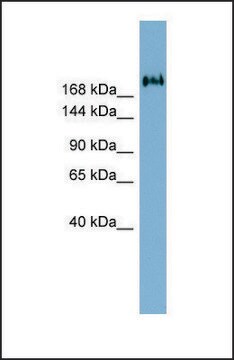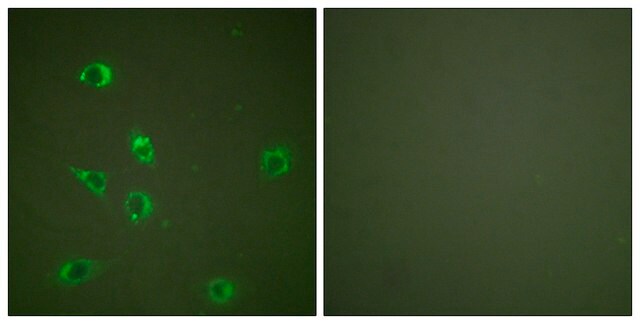おすすめの製品
由来生物
rabbit
結合体
unconjugated
抗体製品の状態
affinity isolated antibody
抗体製品タイプ
primary antibodies
クローン
polyclonal
フォーム
buffered aqueous solution
分子量
antigen 53 kDa
交差性
human, mouse
濃度
~1 mg/mL
テクニック
ELISA: 1:5000
immunofluorescence: 1:100-1:500
NCBIアクセッション番号
UniProtアクセッション番号
輸送温度
wet ice
保管温度
−20°C
ターゲットの翻訳後修飾
unmodified
遺伝子情報
human ... GLP1R(2740)
詳細
Anti-GLP1R Antibody detects endogenous levels of total GLP1R protein.
Glucagon-like peptide 1 receptor (GLP1R) protein belongs to the class B G protein-coupled receptor (GPCR) secretin family. This classic seven-transmembrane protein is abundantly expressed in the cardiovascular system. The GLP1R gene is located on the human chromosome 6p21. Anti-GLP1R Antibody detects endogenous levels of total GLP1R protein.
免疫原
The antiserum was produced against synthesized peptide derived from human GLP1R.
Immunogen Range: 101-150
Immunogen Range: 101-150
アプリケーション
Anti-GLP1R antibody produced in rabbit has been used in immunofluorescence staining.
生物化学的/生理学的作用
Glucagon-like peptide 1 receptor (GLP1R) protein participates in the activation of protein kinase A (PKA), phosphoinositide 3-kinase (PI3K), MEK1/2, and endothelial nitric oxide synthase (eNOS) pathways. Hence, it plays a key role in apoptosis reduction, improved energy metabolism, decreased inflammation in myocardial cells, and vasodilation in myocardial arteries. The large N-terminal extracellular domain of GLP1R participates in ligand binding. Alterations in the GLP1R gene might increase the risk of coronary artery disease (CAD).
特徴および利点
Evaluate our antibodies with complete peace of mind. If the antibody does not perform in your application, we will issue a full credit or replacement antibody. Learn more.
物理的形状
ウサギIgGのPBS溶液(Mg2+およびCa2+を含まず)、pH 7.4、150 mM NaCl、0.02% アジ化ナトリウム、50% グリセロール
免責事項
Unless otherwise stated in our catalog or other company documentation accompanying the product(s), our products are intended for research use only and are not to be used for any other purpose, which includes but is not limited to, unauthorized commercial uses, in vitro diagnostic uses, ex vivo or in vivo therapeutic uses or any type of consumption or application to humans or animals.
適切な製品が見つかりませんか。
製品選択ツール.をお試しください
保管分類コード
10 - Combustible liquids
WGK
nwg
引火点(°F)
Not applicable
引火点(℃)
Not applicable
最新バージョンのいずれかを選択してください:
Xiaowei Ma et al.
Journal of diabetes research, 2018, 1054192-1054192 (2018-10-03)
Glucagon-like peptide 1 (GLP-1) bestows protective effects upon the cardiovascular system through direct cardiovascular interactions or by improvements to metabolic function. Both these effects are thought to be at least partly mediated by the GLP-1 receptor (GLP-1R). This case-controlled study
Sama Abdulmalik et al.
Differentiation; research in biological diversity, 120, 1-9 (2021-06-02)
Tendon injuries are common and account for up to 50% of musculoskeletal injuries in the United States. The poor healing nature of the tendon is attributed to poor vascularization and cellular composition. In the absence of FDA-approved growth factors for
Qian Zhang et al.
BMC complementary and alternative medicine, 14, 188-188 (2014-06-11)
Berberine is known to improve glucose and lipid metabolism disorders, but it poorly absorbed into the blood stream from the gut. Therefore, the exact underlying mechanism for berberine is still unknown. In this study, we investigated the effect of berberine
Yichao Fan et al.
Molecular vision, 20, 1557-1568 (2014-12-10)
Exendin-4 (E4), a long-acting agonist of the hormone glucagon-like peptide 1 receptor (GLP-1R), is administered to treat type II diabetes in the clinical setting and also shows a neuroprotective effect. Our previous studies demonstrated its protective effect in early experimental
Sze Wa Chan et al.
Neuropharmacology, 83, 71-78 (2014-04-15)
The use of glucagon-like peptide-1 (7-36) amide (GLP-1) receptor agonists for the treatment of type 2 diabetes mellitus is commonly associated with nausea and vomiting. Previous studies using Suncus murinus revealed that the GLP-1 receptor agonist, exendin-4, induces emesis via
ライフサイエンス、有機合成、材料科学、クロマトグラフィー、分析など、あらゆる分野の研究に経験のあるメンバーがおります。.
製品に関するお問い合わせはこちら(テクニカルサービス)